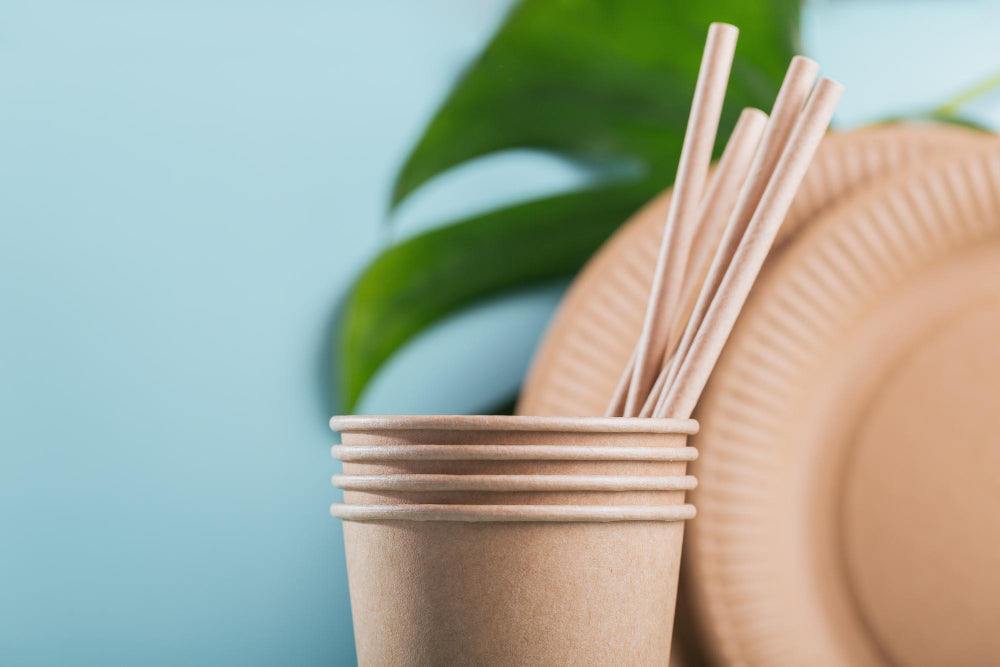

Understanding Biodegradability: The Truth About Disposable Straws and Compostable Drinkware
As the environmental impact of plastic pollution continues to make headlines, more and more businesses and consumers are seeking sustainable alternatives. The adoption of compostable drinkware and straws has been growing steadily, alluring individuals with the promise of disposability without the guilt of contributing to an increasingly polluted planet.
But with this rise in demand, there's also an urgent need for education and clarification on what "biodegradable" and "compostable" really mean, and how they measure up against conventional disposable straws. Plant-based, no waste.
To make informed decisions, it's essential to understand the fundamental differences between materials used in disposable straws and compostable drinkware like those made from PHA (polyhydroxyalkanoates). In this educational and engaging blog post, we'll dive into the science of biodegradability and explore the factors that contribute to the environmental impact of various types of drinkware.
By examining these distinctions, we aim to empower businesses, particularly those in the foodservice industry, and individuals with the knowledge needed to make conscious and sustainable choices that align with their eco-friendly goals. Consciously convenient.
From the role of microbes in the decomposition process to the significance of commercial composting facilities, our comprehensive guide will demystify the complex world of biodegradability for you.
Whether you already use compostable drinkware or are considering making the switch, you'll gain valuable insights into the sustainable advantages of PHA-based products and why they're the superior choice for businesses, consumers and the environment alike. No plastic, just fantastic!
The Science of Biodegradation: How It All Breaks Down
To understand why compostable drinkware is a more sustainable choice, we must first explore the science of biodegradation. At its core, biodegradation refers to the process by which organic materials are broken down by microorganisms, such as bacteria, fungi, and algae. However, not all materials biodegrade at the same rate, and some factors can influence the process:
- Material Composition: Different materials have varying degrees of biodegradability due to their molecular structure. Conventional plastics, such as those used in disposable straws, are derived from fossil fuels and have complex structures that are difficult for microorganisms to break down.
- Environmental Conditions: Factors such as temperature, moisture, and oxygen levels can significantly impact the biodegradation process. Ideal conditions for biodegradation are typically found in commercial composting facilities that regulate these factors to promote rapid decomposition.
Differentiating Disposable Straws and Compostable Drinkware
Now that we've covered the basics of biodegradation, let's look at how disposable straws and compostable drinkware differ in terms of their environmental impact:
- Material Matters: Conventional disposable straws are made from petroleum-based materials like polypropylene, which pose significant environmental risks due to their slow rate of biodegradation. In contrast, compostable drinkware is made from materials like PHA, derived from renewable plant sources, and designed to decompose quickly in appropriate conditions.
- End-of-life Disposal: Unlike disposable straws that persist in landfills or the natural environment for centuries, compostable drinkware can be processed in commercial composting facilities, converting them back into nutrients for the soil within a matter of months.
Exploring the Advantages of PHA-based Compostable Drinkware
There are several reasons why compostable drinkware made from materials like PHA stands out as the superior, eco-friendly choice:
- Speedy Decomposition: As mentioned earlier, PHA-based products decompose at a much faster rate than conventional plastics. When disposed of in commercial composting facilities, these products can break down in just a few months, significantly reducing their environmental impact.
- Reduced Greenhouse Gas Emissions: The production of PHA-based materials generates lower levels of greenhouse gases compared to petroleum-based plastics. By choosing PHA compostable drinkware, businesses can contribute to a reduction in global emissions and help mitigate climate change.
- Renewable Resource: Unlike conventional plastics that rely on non-renewable fossil fuels, PHA is derived from renewable plant sources. This reliance on sustainable resources not only reduces the strain on finite resources but also supports more eco-conscious manufacturing practices.
Understanding the Role of Commercial Composting Facilities
While compostable drinkware offers many environmental benefits, it's critical to recognize the importance of proper end-of-life disposal:
- Composting vs. Landfills: Compostable products require specific conditions, such as the elevated temperatures and regulated moisture levels found in commercial composting facilities. These conditions enable microbes to efficiently break down the material, allowing it to decompose much faster than in landfill conditions.
- Availability and Access: With the growing demand for compostable products, the number of commercial composting facilities across the country is also expanding. Business owners and consumers should research local composting options to ensure compostable waste is appropriately processed.
- Educating Customers: Encouraging responsible disposal of compostable straws and drinkware is essential. Make sure to clearly communicate how and where customers should dispose of these items to ensure they're processed correctly and make an actual beneficial impact.
Harnessing the Power of Biodegradability for a Greener Future
Understanding the science behind biodegradability is a crucial step in making informed decisions about disposable straws and compostable drinkware. By choosing sustainable materials such as PHA and supporting the use of commercial composting facilities, businesses and consumers can significantly reduce their environmental impact and contribute to the global effort against plastic pollution. No plastic, just fantastic!
As a concerned business owner or consumer, you have the power to effect positive change. The more knowledgeable you become, the better equipped you are to make eco-conscious choices and support a greener future for generations to come. Consciously convenient, each step you take towards sustainability helps pave the way for a cleaner, healthier planet for all. Shop at Anu Drinkware now to buy biodegradable plant-based straws!



